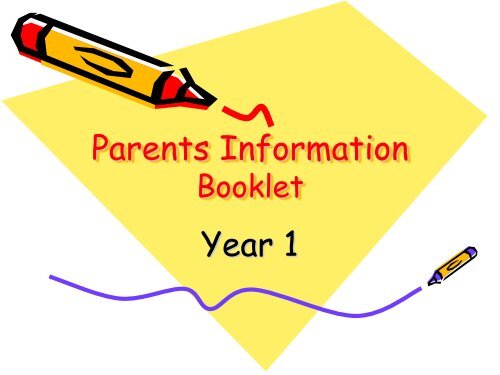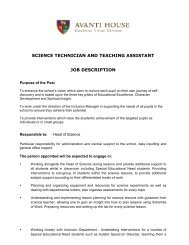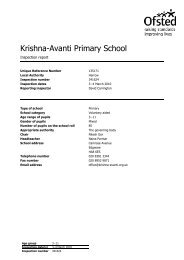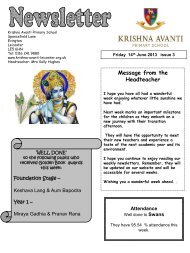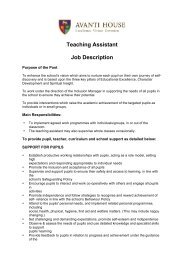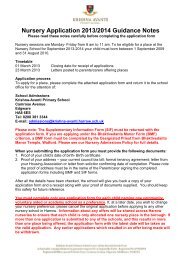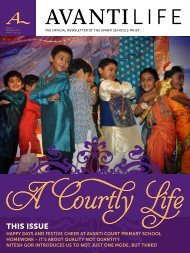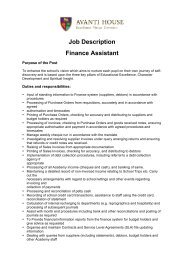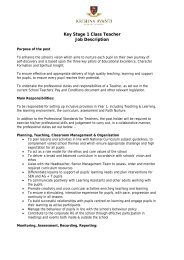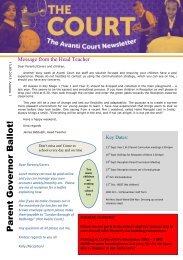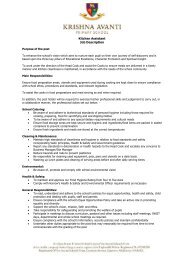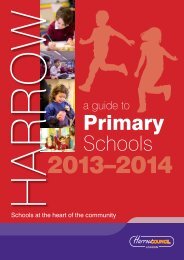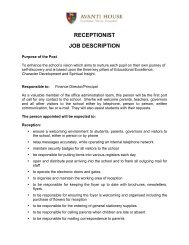Parents Information Year 1 - Avanti Schools Trust
Parents Information Year 1 - Avanti Schools Trust
Parents Information Year 1 - Avanti Schools Trust
Create successful ePaper yourself
Turn your PDF publications into a flip-book with our unique Google optimized e-Paper software.
<strong>Parents</strong> <strong>Information</strong>Booklet<strong>Year</strong> 1
Numeracy• Maths equips pupils witha powerful tool tounderstand the world.These tools include logicalreasoning, problemsolving skills and theability to think in moreabstract ways.• Maths is important ineveryday life.
Numeracy In <strong>Year</strong> 1• During year 1 your child will develop theirknowledge and understanding of maths throughpractical activities, exploration and discussion.• They will be provided with opportunities to read,write and order numbers as well as develop arange of mental calculation strategies.• This work all builds upon pupils prior experienceof maths based on the early learning goals.
Numeracy Lessons• Now that your children are of statutory school age, they will beexpected to cover aspects of the National Curriculum within theirMaths lessons.• These lessons consist of a mental starter where games/chants and theinteractive whiteboard are used to develop quick recall skills.• Main Activity: where certain new concepts are introduced or pastones reinforced.• Plenary: children are assessed on their understanding of conceptsintroduced in main activity and misconceptions can be addressed.
Changing Curriculum• This year the curriculum in <strong>Year</strong> 1 hasbeen adapted to ensure a smoothtransition from the Foundation Stage.• Work is far more practical and a widerange of resources are used.
Number Tracks• Children’s early experiencesof calculations begin withusing actual objects forcounting.• They then develop to usingnumber tracks wherenumbers are placed along agrid.
Number Lines• The children then develop tousing a number line.• Number lines help children todevelop mental images of thenumbers in order.• These are based on the idea ofusing a number to measure adistance along a ruler. A pointis labelled 0 and then steps ofequal length are marked out.• Children are able to see clearlythat 10 lies at a greaterdistance from 0 than 4.
Number Lines• Number lines can alsobe used to show thedifference between 2numbers.
Number Fans• These are used to help usassess children’sunderstanding of numberrecognition and additionand subtraction.• E.g. show me one morethan 3, show me whichnumber goes with 2 tomake 10.
Bead Strings• These are used to aidcounting on and back in1’s and 10’s.• To find a particularnumber such as 13.(helpswith partitioning into tensand ones)• To explore number bonds.• They are also the nextstep towards using emptynumber lines.
Maths Expectations• By the end of the year most children will:• Count reliably at least 20 objects• Write the numbers 0 to 10.• Recognise 0 as none or zero in context.• Understand the operation of subtraction (as 'take away'). and use the related vocabulary.• Add and subtract numbers when solving problems involving up to 10 objects in a range of contexts.• Understand that addition can be done in any order.• Some children will not have made so much progress and will:• Count, read and order numbers up to 10 in a range of settings.• Write numbers up to 10 with increasing accuracy.• Count on and back in ones from any small number.• Understand the operation of addition and use the related vocabulary.• Use numbers up to 10 to solve problems involving addition or subtraction.• Compare two sets to find a numerical difference.•Some children will have progressed further to:• Count, read and order numbers from 0 to 20.• Beginning to understand place value.• Recognise odd and even numbers to 20.• Recognise simple number sequences eg counting on or back in 2's.• Within the range 1 to 30. say 1 or 10 more or less than any given number• Begin to know bv heart all pairs of numbers with totals up to 10.• Use above facts to add or subtract pairs of numbers mentally.
English• In English there are three main areas. These are speaking andlistening, reading and writing.• Speaking and Listening• In class we work on both of these skills as they are essential formaking good progress in both reading and writing. Children arealways encouraged to speak in complete sentences with an audiblevoice.• Children work individually, in pairs, in small groups and as a class.They are expected to join in discussions and make relevant points.They also learn to listen carefully to what other people say so thatthey can remember the main points of a discussion in order toexpress their ideas and feelings clearly.
Reading• Children have two formal reading sessions per week and in most cases, takehome two different books to read each week. One session is with the classteacher and is called Guided Reading, the other is an individual session witheither a T.A. or adult helper. Of course they actually read in a great varietyof situations every day.• Guided Reading• This is when a group of children read the same unseen text. (Occasionally atthe beginning of the year there may be some overlap of texts when a fewchildren have to swap groups.) They work on learning objectives rangingfrom strategies to decode words or sequencing events in a story through tocommenting on the type of text. When they have read a book in school theythen take it home to share with you. This is where you can make a realdifference. Children who have a happy reading experience at home will makeprogress more easily.
Reading Expectations• By the end of the year most children will:• · Read about 90 per cent of an appropriate text independently with• accuracy.• · Pause to consider the text or confirm meaning.• · Make comments about traditional characteristics (good angel/bad wolf).• · Retell a story with some reliance on illustrations for prompts.• Some children will not have made so much progress and will:• · Recognise some common words.• · Attempt unfamiliar words with support.• · Answer simple questions expressing likes/dislikes on some interesting• aspect of the text.• Some children will have progressed further and will:• · Read with accuracy and good pace.• · Take some account of punctuation.• · Make some effort to self correct for sense.• · Comment on setting or how a plot is linked together.• · Be able to retrieve information to answer literal questions.• · Begin to show an understanding of inference.
Writing• Writing is the mostdifficult aspect of Englishfor most children. In theFoundation Stage theywill have learned how torepresent sounds withletters and have hadmany opportunities toexpress their ideas. In<strong>Year</strong> 1 we build upon thisstart to support theirprogress.
Talk For Writing• Children need to have opportunities to talk about what they aregoing to write, both to the teacher and other children. This helps toclarify their ideas and extend their range of vocabulary. In class thechildren have Talking Partners so they can rehearse things they wantto write about a given topic.• This year, we are delivering the curriculum through topics. Childrenwill begin the year by working in small focus groups and thengradually will take more responsibility for writing independently asthe year goes on. The children will be encouraged to use acombination of common words they have learned to spell, wordsfrom word banks on particular topics and to have a go at writingmore ambitious words using their phonic knowledge. They will havemany opportunities to write about their own experiences, facts theyhave learned and imaginative situations.
Writing Expectations• By the end of the year most children will:• · Communicate meaning through simple words and phrases to show an• awareness of story structure and topic based factual writing.• · Show some awareness of how full stops are used in writing and• discussion• · Make some connections between ideas and events linked in a simple• sequence.• · Spell some common words correctly.• · Make phonetically plausible attempts to spell other words.• · Shape letters clearly.• · Show correct orientation.• Some children will not have made so much progress and will:• · Be able to spell some words correctly.• · Know that words are separate units.• · Write so that most of it can be read independently of the child.• · Form most letters correctly.• Some children will have progressed further and will:• · Communicate ideas in sentences.• · Show some characteristics of narrative and non-narrative styles,• although this may be abbreviated or disjointed.• · Shows some evidence of punctuation.• · Sometimes reflect spoken rather than written language.• · Use appropriate vocabulary effectively.• · Spell common words correctly and make plausible attempts at longer• words.• · Have legible handwriting with some evidence of joining.•
Level 1bLevel 1a
An extract from a level 2b piece of writing.
Handwriting• It is important for children to form their letterscorrectly so that they can present their work well.When they write at home please ensure that theyform their letters according to the style we teachin school. A copy of how letters are formed isincluded in this pack.• Handwriting is assessed when giving a level to apiece of writing. Examples of marks are alsoincluded.
Letter Formation


